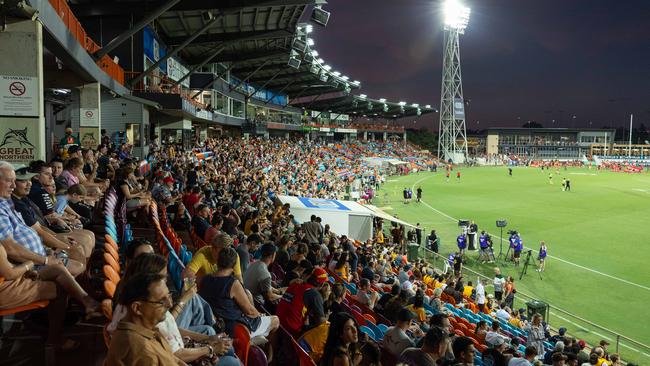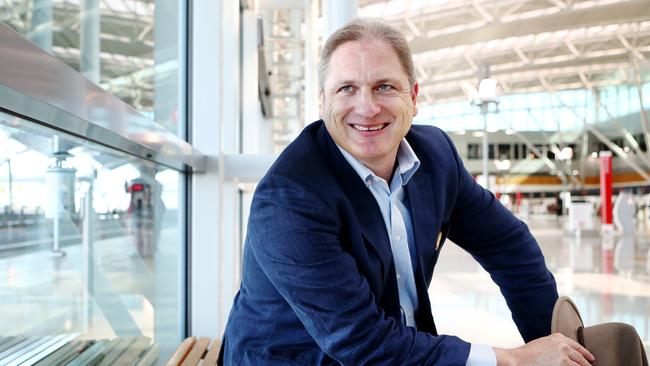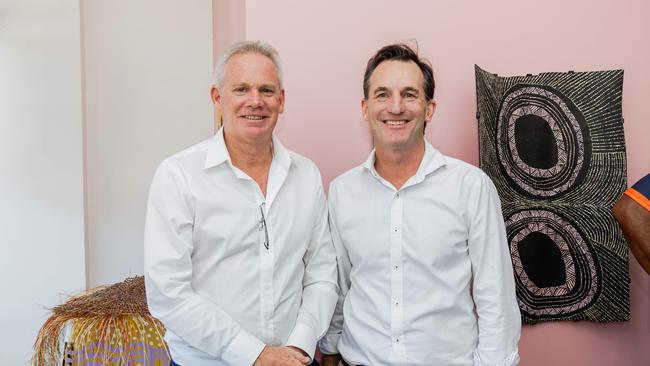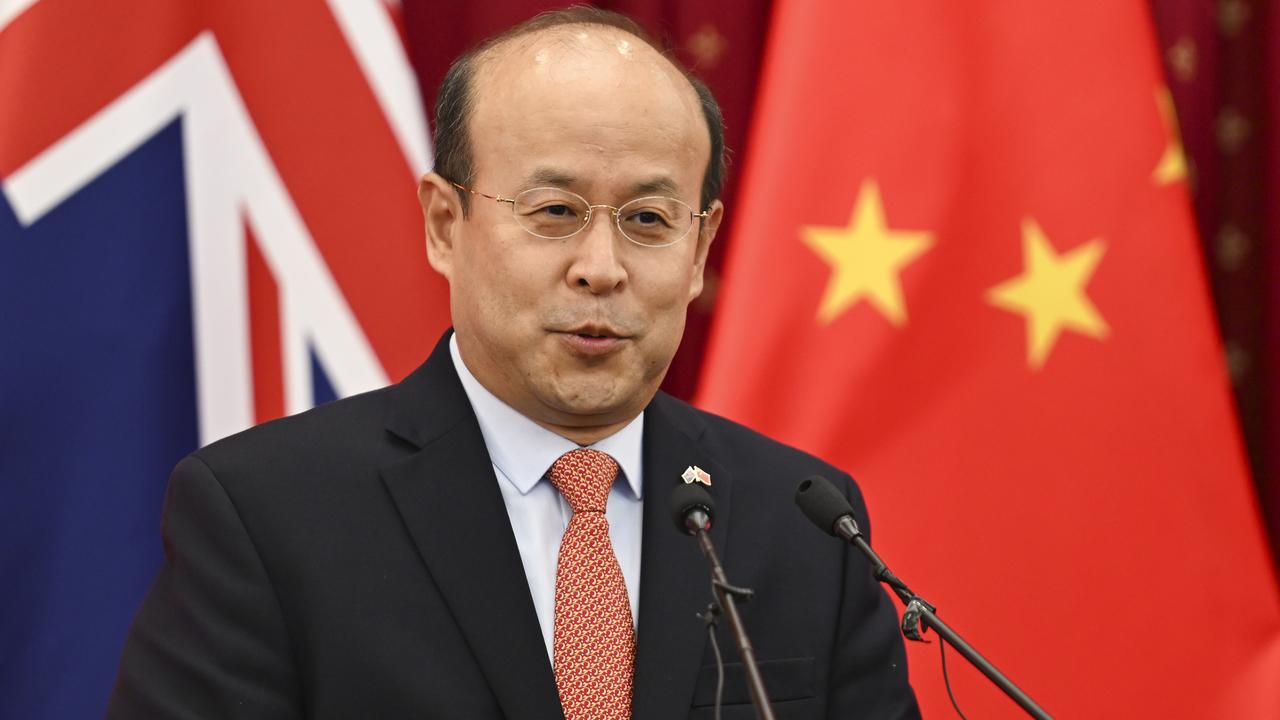Stong business case sets stage for NT AFL team
When the Tassie Devils join the AFL, in 2028, as the 19th team, Darwin will be the only capital city without a national team, but their case for the 20th is strong, writes Tim Harcourt.

When the Tassie Devils join the AFL, in 2028, as the 19th team, Darwin will be the only capital city in Australia without an AFL or NRL team.
Will the AFL go in and defend their territory which it failed to do in Canberra all those years ago?
The case for a NT team in the AFL – to be called the Darwin Dingoes or Darwin Crocs – is considered a romantic notion in some ways but the footy case is strong.
The Territory has produced rich reservoirs of football talent from Alice Springs to the Arafura Sea.
Playing talent like Michael Long, the Rioli family, Andrew McLeod and Nathan Buckley roll off the tongue of any Aussie Rules diehard and many Territory (often Indigenous) players become famous in the state leagues of SA and WA as well as the AFL.
Many play in the Northern Territory Football League (NTFL) before heading down south in what is the ‘off season’ for the Top End.

In fact, according to James Coventry’s neat little book, Footballistics, 2018 the NT is truly Aussie Rules heartland in terms of participation and talent.
In terms of ‘footy readiness’, according to Coventry, the NT often comes top in terms of participation rates.
For a small population of just over 240,000 people, more than 13 percent of Territorian participate in AFL programmes compared to eight per cent in WA, six per cent in SA and two per cent in Victoria.
NT is top in terms of adult participation and top four in terms of children’s participation.
In fact in non-metropolitan areas, Coventry found there were 22,000 registered participants, in 2018, which means every child outside Darwin and Alice Springs plays footy, not allowing for the many unregistered participants who are also playing.
In 2022, this had grown to around 40,000 participants. And in terms of talent, NT produces 56 elite AFL players per million people with only Victoria and SA ahead.
And in the NT, they simply love footy.
Just watching the finals from the Tiwi Islands or Central Australia will tell you that it also shows up statistically with almost half the population favouring the AFL column in terms of google searches, ranking it with the traditional Aussie Rules states Tasmania, SA, Victoria and WA.
The NT AFL Club Taskforce, in their Strategic Business Case for the 20th licence has examined a number of options.
These include more AFL matches in Darwin and Alice Springs, a relocated team, or a Darwin based stand-alone Northern Territory team that also plays in Alice.

They even consider a Northern Australia team (Darwin based but also playing in Cairns in Far North Queensland) although it may be better to have the Queensland teams, Brisbane Lions and Gold Coast Suns develop Far North Queensland, Central Queensland and the Sunshine Coast and let the NT team focus on Darwin and Alice Springs.
Hawthorn is also considering playing a few games in Cairns.
Of course, that’s the footy case. It seems an open and shut case. But the economic case for the NT is much harder.
Especially given climate, population and financial considerations if the NT team requires a new stadium or upgrades to TIO stadium in Marrara, Darwin and TIO Traeger Park Oval in Alice Springs.
As experience shows with NT teams even the basketball team the Darwin Salties struggled and eventually fell due to financial constraints.
Even with a significant AFL contribution of $7.83 million per year, the Taskforce forecast the NT AFL Club would need Federal and NT Government to fund an operation funding gap of $18.89 million per annum.
This would include a new or upgraded stadium with AFL NT chairman Sean Bowden explaining that; “The Stadium will anchor the opportunity to bid for a 20th licence in the AFL should that opportunity arise.”
However the Taskforce noted that: “the economic benefit to the NT could be as much as $559 million if the new club was provided with a new stadium.
The Strategic Business Case indicates that an AFL Team would create 160 full-time jobs, bring game day activation of the economy and add $116M a year in economic output to the Territory economy.”
Hand in hand with the economic benefits comes the social impacts.
The NT has a serious problem with diabetes and associated health problems, low educational attainment and imprisonment.
The Taskforce would develop pathways for participation not only for elite footballers in an AFL and AFLW team but also create a social safety net of social programs for all Territorians under the umbrella of the NT AFL team.
Social cohesion is important for internal security in the same way as defence is important for external security.
In some ways, the NT team might be considered a national security, (internal social cohesion) project.
In the same way as the PNG team in the National Rugby League (NRL) is getting support from the Commonwealth Government for geo-political reasons (external security) to the tune of $600 million as part of a $750 million ambitious investment by the NRL
Darwin was the only capital city bombed in war time in 1942, it is considered to be vital to our defence strategy, and the new tensions in global geopolitics will see a review of our defence assets and arrangements.
For instance, the lease of the Port of Darwin to a Chinese Government linked company would never have happened in today’s global climate.
So just like having an NRL team in PNG, the Commonwealth might consider having an AFL team in Darwin as important to national security.
And as many seasoned commentators (hello Ross Gittins) always say - what do you do when economists question a project? Put it in the defence budget under ‘national security’.
It may be a stretch to consider it part of defence although the AFL might like this as it would allow them to ‘defend their territory’ and keep the NT a predominantly Aussie rules zone.
And there’s no doubt that the Aussie rules footy community would love it.
As the legendary AFL commentator Bruce McAvaney once said the NT would ‘complete the jigsaw’ in the national competition of Australia’s truly indigenous home-grown game.
There’s that romance coming up again. Australia’s only indigenous game with AFL teams from Tasmania to the Top End and from the East Coast to the West Coast in every Australian capital city. It might be just too much for the AFL, as custodians of the great Australian game, to resist.
*Professor Tim Harcourt is industry professor and chief economist at the Centre for Sport, Business and Society (CSBS), University of Technology Sydney and author of Footynomics and the Business of Sport
More Coverage
Originally published as Stong business case sets stage for NT AFL team





